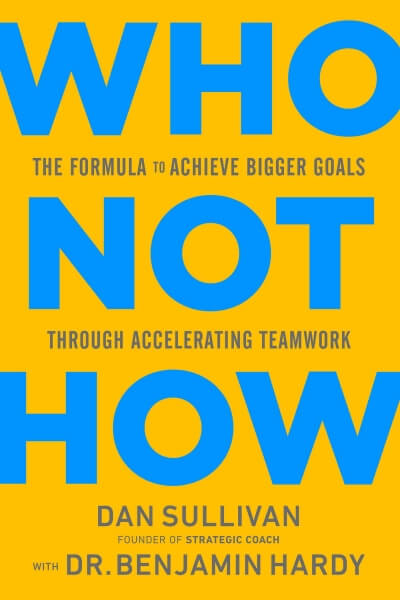
2 Sentence Summary
“Who Not How” by Dan Sullivan presents a fresh approach to entrepreneurship, collaboration, and goal-setting by emphasizing the power of delegation. By engaging others, called “Whos” to contribute their unique strengths, you can foster a mutually beneficial network, achieve goals more efficiently, and cultivate lasting professional relationships.
Summary Read Time: Less than 5 minutes
Actual Book Length: 193
First Published in: 2020
Key Lessons from The Book:
- Unlock Your Potential with the Power of “Whos”
- “Whos” Enhance Your Perspective and Boost Effectiveness
- Procrastination: Harmful to Confidence, Yet a Marker of Wisdom
- Freedom Of Time Unlocks Financial Freedom
- Transformational Leaders Focus on Outcomes, Not Procedures
- Fostering Transformational Relationships Through Shared Value Creation
Below is the detailed yet quick summary of the book Who Not How covering each idea:
Lesson 1 – Unlock Your Potential with the Power of “Whos”
In 1984, Michael Jordan joined the Chicago Bulls as a rising basketball star, showcasing his exceptional talent. Despite his abilities, the Bulls faced early playoff eliminations during Jordan’s first three seasons, revealing the need for teamwork and collaboration instead of individual efforts.
The key message is that enlisting “Whos” helps you focus on your unique abilities and achieve your goals. Jordan needed several “Whos,” such as Scottie Pippen in 1987, who helped him refine his game and become a team player. However, it wasn’t until Phil Jackson became the head coach in 1989 that the team truly transformed into a tight-knit powerhouse. Jackson developed a strategy called the triangle offense, which eventually led the Bulls to win six championships between 1991 and 1998.
The Chicago Bulls’ journey to success underscores the importance of the “Who Not How” philosophy. It raises the question, if one of the greatest basketball players of all time needed multiple “Whos” to achieve his goals, who can help you accomplish yours?
Lesson 2 – “Whos” Enhance Your Perspective and Boost Effectiveness
At 16, Richie Norton sought a job for the summer, but his father suggested an alternative: buying misshapen watermelons at a discount and reselling them. With his father’s guidance, Richie quickly sold out his stock and had the rest of the summer free. This highlights how “Whos” can broaden your vision and expand your efficacy.
The Self-Expansion Model, developed by psychologists Dr. Elaine Aron and Dr. Arthur Aron, posits that efficacy is context-based, not solely reliant on innate ability. A supportive context, such as having someone like Richie’s father, can be more important than individual skills. Results matter more than doing everything by yourself.
To increase your efficacy, consider close relationships that provide resources, such as money, possessions, time, help, or perspective. Reflect on your goals and evaluate if including others could benefit your vision. Involving others not only brings fresh insights but also strengthens your commitment to your goals.
Lesson 3 – Procrastination: Harmful to Confidence, Yet a Marker of Wisdom
Procrastination, a common struggle for many, often carries negative connotations due to its detrimental psychological effects. These effects include amplifying guilt, reducing self-confidence, and exacerbating depression. However, procrastination can also signal a meaningful goal or ambition, where you may simply lack the knowledge or skill to achieve it independently. In essence, procrastination can be both damaging to your well-being and a sign of wisdom.
Breaking free from the cycle of procrastination requires direct action and the recognition that you cannot achieve your goals alone. Identifying the right “Whos” to help you accomplish your objectives is crucial. To do so, be explicit about your goal and your needs, which will enable you to find the right collaborators for your project.
Dan Sullivan’s Impact Filter is a valuable tool for outlining your motivations, purpose, and desired impact for a project. By considering the best possible result of taking action and the risks of inaction, you can establish clear expectations for success. With well-defined results, potential “Whos” will be better equipped to assist you in achieving your goals.
Lesson 4 – Freedom Of Time Unlocks Financial Freedom
Dean Jackson, a real estate agent turned coach, discovered the value of hiring a “Who” to handle tasks that would free up his time. By investing in Mandy to make his condo “one-week ready,” Jackson increased his earning capacity and focused on higher impact activities for his business.
Asking “Do I really want to give my attention to this task or could it be spent better elsewhere?” can lead to freedom of time and money. Attorney Jacob Monty hired a driver to handle transportation, allowing him to focus on reviewing documents and preparing for hearings, ultimately increasing his revenue.
Achieving ambitious goals involves eliminating nonessential decisions. Delegating tasks to a “Who” allows you to focus on what truly matters, boosting productivity and overall success.
Lesson 5 – Transformational Leaders Focus on Outcomes, Not Procedures
Michigan attorney Nicole Wipp faced burnout after founding her own law firm, working 80- to 100-hour weeks. The key message here is that transformational leaders commit to results, not processes. By realizing she needed help and hiring full-time staff to handle specific tasks, Wipp was able to prioritize both her well-being and supporting her employees.
Escalation of commitment occurs when a leader invests more in a goal or project, resulting in increased dedication. Transformational leaders not only invest in their Whos but also challenge and mentor them. This approach boosts the team’s commitment and performance.
By fostering creativity and autonomy, transformational leaders like Wipp encourage independent thinking among their team members. This leadership style inspires everyone involved to reach the same level of commitment, ultimately benefiting both the leader and their team.
Lesson 6 – Fostering Transformational Relationships Through Shared Value Creation
In the world of Who Not How, it’s essential to remember that the exchange of value goes both ways. While someone may be helping you achieve your goals, you can also assist them in realizing their own ambitions. To create lasting relationships, focus on providing value to others rather than solely looking for personal gains.
Prioritizing the value you offer to others can result in increased connections and eagerness to help you. Joe Polish’s networking principles, exemplified by his interactions with Richard Branson, demonstrate the power of a “What’s in it for them?” mindset. By consistently providing value, Polish has cultivated strong relationships with influential business leaders.
Finally, gratitude is crucial in nurturing transformational relationships. Recognize and appreciate the efforts of others, expressing sincere gratitude for their assistance. A humble and thankful attitude will help maintain positive connections and attract more supportive Whos into your life.





